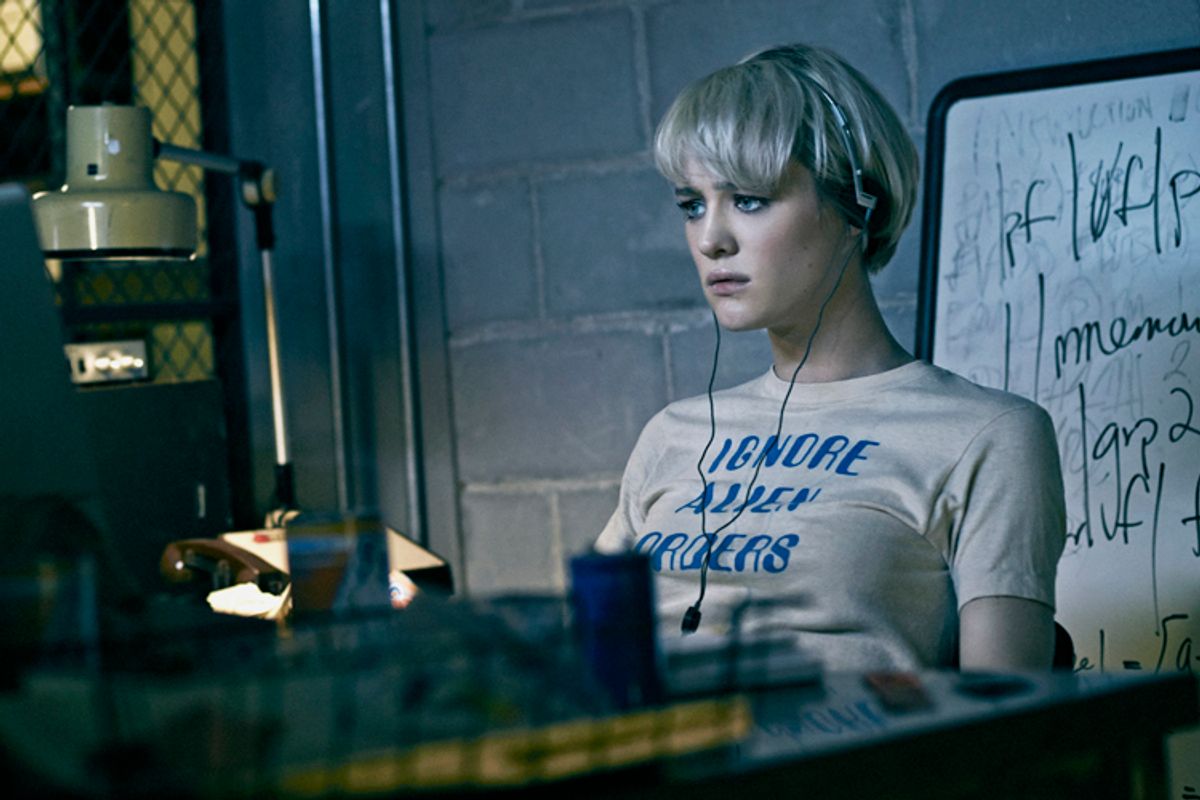Over the weekend, the New York Times ran a column by Nitasha Tiku, the co-editor of the Silicon Valley news and gossip site Valleywag, about the historical difficulty of getting girls involved in coding -- a failure chalked up in part to tech's inability, thus far, to engage with girls on their own level. Tiku's piece represented the gender gap in tech as a major problem -- and one that realistically can be solved by engaging girls through gaming.
But if, indeed, the degree to which the tech industry has failed to get girls and women involved is a problem, you'd never have known it from Sunday night's TV offerings. The season finale of "Silicon Valley," on HBO, provided more of what it's given us all season, while the new AMC drama "Halt and Catch Fire" provided images of two women who code -- one a harridan, one a fantasy figure.
On "Halt and Catch Fire," AMC's latest attempt to build a new "Mad Men" or "Breaking Bad"-style prestige hit, women are present but not quite human. The show tells the story of the effective birth of what we think of as the tech industry back in 1983 Texas, set into motion by two male programmers (Lee Pace and Scoot McNairy) reverse-engineering an IBM computer for Cardiff Electric. McNairy's character has a wife at home (Kerry Bishé) who's frustrated by her husband's inability to hold down a steady job so that she can pay for the kids' dentist appointments; she's given a back story as a computer programmer herself, but she exists in the plot to be an obstacle. It's a story that feels reheated from some other series or movie from years ago; it's hardly offensive or anything, but the wife nagging the husband to leave his pipe dreams behind is far too tired a trope to energize a TV show in 2014.

Hackneyed, too, is Cameron Howe, the razor-sharp programmer hired by Cardiff Electric at the end of the episode. We've met Cameron earlier in the episode -- she (don't let the name fool you!) has come up with a hack so that she can play arcade games all day on a single quarter; she's plainspoken to the point of rudeness; she (gasp!) has sex in a manner we're meant to perceive as "like a man." Cameron's played well, in the pilot, by Mackenzie Davis, but the character isn't really a character -- it's a scrapple of leftovers from "The Girl With the Dragon Tattoo" and "Hackers." One episode (all AMC made available to the press) may be too brief to judge a character, but it's hard to believe Cameron will sprout a personality much beyond generically "edgy" in the subsequent episodes.
The representation of female characters on television shows isn't a question of pure numerical representation -- it's a question of acknowledging half of the human race as people with working brains and stories to tell. "Silicon Valley" has been much-debated over the course of its eight-episode run along much the same lines as was the 2010 film "The Social Network," a dramatic take on the same "men coding" material. Was the show's failure to depict a single real woman character amid a sea of men effective satire of its characters' homosocial environment and blinkered mind-sets, or was it just a failure? The incubator house on "Silicon Valley," in its early episodes, was host to an aggressive stripper named Mochaccino and a visiting girlfriend who existed only to deploy a plotline about male-on-male jealousy; later on, a character fell for a girl because she could code, only to learn -- surprise! -- she was only borrowing code from a man. She does know how to tweet, though. The only woman who gets much of a plotline through the season is Monica (Amanda Crew), a high-level assistant to a tech titan, one who catches our protagonist Richard's eye but, up through her mutely clapping for Richard (Thomas Middleditch) during the finale last night, gets less personality than did Sloan on "Entourage." Yikes!
The debates that felt, at first, beside the point on "Silicon Valley" -- the show is satirizing a sensibility, not inhabiting it! -- began to accumulate into a real critique. The show's energy, with long debates over the characters' genitals and the hot women in their orbit, grew oppressive, such that by last night's finale, I was desperate to get out of there.
"Halt and Catch Fire" and "Silicon Valley" approach gender wildly differently -- the former relies on archetypes, while the latter strains to keep women on the edge of the frame. Neither feels much like life, but at least "Silicon Valley" seems aware in moments that it's using humor to illuminate a social condition that needs fixing. "Halt and Catch Fire" is set years before there even was a tech scene at all, and rather than taking advantage of the blank slate, refers only to tropes we've seen a million times before, with women as either pragmatic dream-crushers or dream girl who's tougher than the men. Talk about a binary code.

Shares